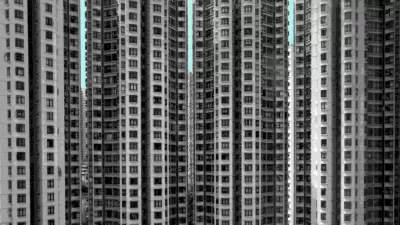The Expo’s stated theme was “Better City, Better Life,” and organizers boasted it was the first World’s Fair devoted to the contemplation of cities.
Its finale Sunday included a "Shanghai Declaration" signed by all participants advocating for greener, more sustainable, and more equitable ones. "We have come to realize that people's understanding and pursuit of a better life are both the foundations and the engines of urban development," the official English translation stated. As the Expo's chairman unequivocally put it, "I think the key is now to solve the problems that have been brought about by development through development. The priority is development."
In one of the themed pavillions, visitors were introduced to the designs of Le Corbusier, whose rows of identical apartment towers have been more or less executed in much of urban Shanghai. In the Expo's telling, Corbusier "always designed cities as beautiful as possible, ‘with enthusiasm, with faith in love and beauty ' Regrettably, his works were not sufficiently appreciated by his contemporaries."
This topic touched a nerve in a city where forced demolitions and associated relocations have become commonplace. There would have certainly been no Expo without it. Building the fair required stripping the footprint clean of the shipyard and worker housing that once stood there, relocating 10,660 families in the process. In the months ahead, local authorities will flatten the site again, as the first Expo devoted to sustainable urban development is destined to be landfill.
FULL STORY: After The Expo: Urban Renewal With Chinese Characteristics

Study: Maui’s Plan to Convert Vacation Rentals to Long-Term Housing Could Cause Nearly $1 Billion Economic Loss
The plan would reduce visitor accommodation by 25,% resulting in 1,900 jobs lost.

North Texas Transit Leaders Tout Benefits of TOD for Growing Region
At a summit focused on transit-oriented development, policymakers discussed how North Texas’ expanded light rail system can serve as a tool for economic growth.

Why Should We Subsidize Public Transportation?
Many public transit agencies face financial stress due to rising costs, declining fare revenue, and declining subsidies. Transit advocates must provide a strong business case for increasing public transit funding.

Invasive Insect Threatens Minnesota’s Ash Forests
The Emerald Ash Borer is a rapidly spreading invasive pest threatening Minnesota’s ash trees, and homeowners are encouraged to plant diverse replacement species, avoid moving ash firewood, and monitor for signs of infestation.

Agreement Keeps NYC Congestion Pricing Alive Through Summer
The tolling program will continue while a court considers the city’s lawsuit against the Trump administration.

Private Donations Propel Early Restoration of Palisades Playground
Los Angeles has secured over $1.3 million in private funding to restore the Pacific Palisades playground months ahead of schedule, creating a modern, accessible space that supports community healing after recent wildfires.
Urban Design for Planners 1: Software Tools
This six-course series explores essential urban design concepts using open source software and equips planners with the tools they need to participate fully in the urban design process.
Planning for Universal Design
Learn the tools for implementing Universal Design in planning regulations.
Ascent Environmental
Borough of Carlisle
Institute for Housing and Urban Development Studies (IHS)
City of Grandview
Harvard GSD Executive Education
Toledo-Lucas County Plan Commissions
Salt Lake City
NYU Wagner Graduate School of Public Service




























